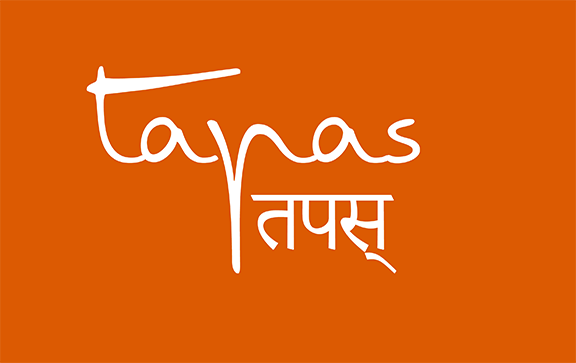 In this monthly series on the Yamas and Niyamas, Swami Karunananda offers wisdom and reflections on applying these foundational principles of Yoga in daily life. This month’s focus is on Tapas, austerity.
In this monthly series on the Yamas and Niyamas, Swami Karunananda offers wisdom and reflections on applying these foundational principles of Yoga in daily life. This month’s focus is on Tapas, austerity.
Sutra 2.43: “By austerity, impurities of body and senses are destroyed and occult powers gained.” —from The Yoga Sutras of Patanjali
FROM SRI SWAMI SATCHIDANANDA:
“The more the pain, the more the gain. No pain, no gain.”
FROM SRI SWAMI SIVANANDA:
“Adapt, adjust, accommodate. Bear insult; bear injury. That is the highest sadhana.”
FROM THE BHAGAVAD GITA (Slokas, 17:14 – 16):
“Serving God, the twice-born, spiritual teachers and the wise; staying pure, virtuous, continent and practicing non-injury — these constitute austerity of the body.”
“Speech which causes no excitement and is truthful, pleasant and beneficial; and the study of scriptures — this constitutes austerity of speech.”
“Serenity of mind, good-heartedness, silence, self-control and purity of thought — this is called mental austerity.”
FROM THE TIRUKKURAL (Verses 261 & 267):
“Tapas means to patiently endure suffering and to not harm any living beings.”
“Like gold which shines brighter the more times it is placed in the fire, so does the burning suffering of austerity purify the soul and make enlightenment shine brighter.”
FROM MOTHER TERESA:
“I think much of the misunderstanding of suffering today comes from … resentment and bitterness. Bitterness is an infectious disease, a cancer, an anger hidden inside. Suffering is meant to purify, to sanctify, to make us Christ-like.”
“I know God will not give me anything I can’t handle. I just wish He didn’t trust me so much.”
MEANING OF “TAPAS”:
- To burn or create heat
- To accept suffering as help for purification
- To accept pain when it comes, without causing pain to others
- Self-discipline
- Austerity
BENEFITS:
- By the physical tapas of fasting, bodily toxins are eliminated.
- By verbal tapas, speech is controlled.
- By mental tapas, accepting pain (though it is the nature of the mind to seek pleasure and avoid pain), we burn our old impressions and the mind becomes steady and strong.
- We gain the power to control the body and senses.
FOR REFLECTION:
- Consider the following: Pain is unavoidable; suffering is optional.
- Swami Satchidananda used to say: “Adversities are blessings in disguise.” Have you found that to be true in your own life?
- Are there any austerities you could practice (of body, speech or mind) to help purify and strengthen yourself?
- Sri Patanjali highlights the last three precepts of niyama: tapas, svadhyaya and Ishvara pranidhana (austerity, study, and devotion/surrender to the Divine) and places them together as Kriya Yoga (the Yoga of Practice) in the very first sutra in the second chapter, which is devoted to sadhana. Why do you think those three precepts are regarded as so important and given this prominence?
PRACTICING TAPAS:
- How do you respond when faced with suffering?
a) Do you resist, resent, or rebel against it?
b) Do you react with fear, anxiety or worry?
c) Do you tend to get depressed?
d) Do you accept it as your karma and that it is purging some negative karma that you’ve incurred by past actions?
e) Do you consider it as God’s will intended for your ultimate benefit? - Can you see a way to come into a more skillful and beneficial relationship with pain when it comes into your life?
- How can the Yoga practices help you to deal with painful circumstances?
- If faced with a painful situation, you can try one of the following approaches:
a) Rather than reacting, witness what is occurring in the body and mind.
b) Analyze the situation and see how best to proceed.
c) Pray to God for the strength and guidance to handle it well.
d) If someone tends to “push all your buttons,” try to see that person as bringing to your attention the lessons and experiences you need at this time.
e) Get in touch with the breath and consciously make it slow, steady, deep and regular.
f) Cultivate such qualities as patience, faith, acceptance and perseverance. To help accomplish this, you can utilize the following Pratipaksha Bhavana technique when practicing alternate nostril breathing. When inhaling, visualize that you are drawing into yourself unlimited quantities of the positive quality you wish to develop. As you exhale, visualize that the opposite negative one is leaving your system. Practice twice a day for 5 – 10 minutes per sitting over the course of a month and you should see good results.
About the Author:
 Swami Karunananda is a senior disciple of Sri Swami Satchidananda. In 1975, she was ordained as a monk into the Holy Order of Sannyas. She has had almost 50 years experience teaching all aspects of Yoga and specializes now in workshops, retreats, and teacher training programs that focus on the science of meditation, the philosophy of Yoga, personal transformation, and Yoga breathing techniques for better health and well-being. She developed, and for 30 years has taught, the Integral Yoga Teacher Training programs in Raja Yoga and in Meditation.
Swami Karunananda is a senior disciple of Sri Swami Satchidananda. In 1975, she was ordained as a monk into the Holy Order of Sannyas. She has had almost 50 years experience teaching all aspects of Yoga and specializes now in workshops, retreats, and teacher training programs that focus on the science of meditation, the philosophy of Yoga, personal transformation, and Yoga breathing techniques for better health and well-being. She developed, and for 30 years has taught, the Integral Yoga Teacher Training programs in Raja Yoga and in Meditation.
Swami Karunananda served as president of Satchidananda Ashram–Yogaville in Virginia and in California, as well as director of the Integral Yoga Institutes in San Francisco and in Santa Barbara. She currently serves on the Board of Trustees, and as the chairperson of the Spiritual Life Board at Satchidananda Ashram–Yogaville, Virginia.
Interested in fostering interfaith understanding and harmony, she is featured in the interfaith documentary entitled, With One Voice. She also compiled and edited the Lotus Prayer Book, a collection of prayers from various faith traditions, and Enlightening Tales as told by Sri Swami Satchidananda. She served as contributing editor for The Breath of Life: Integral Yoga Pranayama, as well as a senior writer for the Integral Yoga Magazine. In her book, Awakening: Aspiration to Realization Through Integral Yoga, she describes the spiritual path and provides guidance for the journey.

